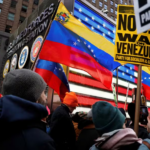
Palestinian families live the pain of hunger in the midst of Israeli blockade, while reports of suffering thrill the world
While crowds gathered at a food distribution point in northern Gaza, Ismail Abu Odeh, six, struggled to get ahead. “Give me a little,” he shouted. Her bowl was full of lentils, but upon returning she fell from her hands. He returned to the family tent crying. An uncle who got some food later shared a little with Ismail. The next day, no water or food delivery came to the displaced field where he lives, located in a school in the city of Gaza, and the people gathered there were bottles and empty bowls. Ismail cried again. The BBC has spent the last two days talking to people in Gaza, while Israel intensifies its military action and continues a total blockade of more than 10 weeks of food, medical supplies and other aids.
There are increasing united nations alerts and other countries that the enclave is on the brink of hunger.
The Israeli government insists that “there is no shortage of food in Gaza and that” true crisis is Hamas looting and selling help. “
Government ministers described the interruption of humanitarian aid as a “main pressure lever” to ensure victory over Hamas and free all hostages. There are still 58 hostages in Gaza, which is believed to be up to 23 to be alive.
Israel does not allow international journalists to have free access to Gaza, so our communication has been made by phone calls and messages from WhatsApp, and through confidence Palestinians who live in the territory.
Those who spoke to the BBC described the difficulty of finding at least one meal a day, with community kitchens closed due to scarcity and scarcity of items in the markets. The items that are still available are inflated, inaccessible prices, they said.
A man who commanded one of the remaining food kitchens in Gaza said he was working “day after day” to find food and oil. Another man we talked to said the kitchen where he worked as a volunteer had closed 10 days ago when the supplies ended, describing the situation as a “disastrous sensation.”
A 23 -year -old woman who lives in northern Gaza said that “dizziness has become a constant feeling,” as was “weakness and fatigue widespread for lack of food and medicine.”
Adham al-Batrawi, 31, who lived in the rich city of Al-Zra, but is now moved in downtown Gaza, said hunger was “one of the most difficult parts of daily life.”
He said people had to be “creative just to survive,” describing whatsapp messages as he cooked the pasta too much and kneaded to a pasta before cooking it on fire to create a bread imitation-a basic food in the Palestinian diet.
“We invented ways to cook and eat that we never imagined we would need,” he said.
He added that the only daily meal he has done lately is “enough to spend the day, but it is far from enough to meet our energy needs.”
Another place in downtown Gaza, in Deir Al-Balah, nurse Rewaa Mohsen said it was a fight to support her two small daughters, three and 19 months.
She said she had stored diapers during ceasefire earlier this year, but they would end in a month.
In an interview with WhatsApp on Thursday, she said her daughters were already used to the sounds of the bombing that echoed by the apartment. “Sometimes I feel more afraid than them,” he wrote, adding that he distracted his daughters with coloring books and toys.
The next day she said by voice message that evacuation orders had been issued to her area before an Israeli attack reached a nearby building.
When she returned home to “clean the mess,” he found that the doors and windows had been torn off.
“Thank God I’m still alive with my girls,” she said.
When asked if she would be in the apartment, she replied, “Where else will I go?”
In Gaza, doctors described the impact of blocking on medical supplies and said they didn’t feel safer at work after Israeli attacks on hospitals.
Nurse Randa Saied said she was working at the European Hospital in Khan Youis when she was hit by an Israeli attack this week, describing the moment as “pure terror and helplessness.”
Israel has long accused Hamas of using hospitals as secret bases and for storage of weapons, which the group denies.
The European hospital is no longer working, but Randa said employees and patients were transferred to Nasser hospital nearby.
“Our patients are mothers, children, daughters, and brothers – just like us. We know, deep down our hearts, that our duty should not end, especially now that they need us more,” she said.

Nasser employees and other hospitals in Gaza told BBC that the blockade made them without basic supplies such as painkillers and gauze, and had to close some services.
The US has confirmed that a new system to provide humanitarian aid to the Palestinians in Gaza through private companies is being prepared, with Israeli forces ready to protect perimeters from centers. The United Nations criticized the plan, saying that it seems to “turn help into a weapon.”
Back in the city of Gaza, Ismail’s father said he was fighting for no longer being able to support his six children.
“My children are going to sleep hungry,” he said. “Sometimes I sit crying like a child if I can’t give them food.”
With information from BBC*
Source: https://www.ocafezinho.com/2025/05/17/meus-filhos-vao-dormir-com-fome-dizem-moradores-de-gaza/

